Is Burqa Banning Freedom or Discrimination
VerifiedAdded on 2022/08/13
|12
|808
|24
AI Summary
Contribute Materials
Your contribution can guide someone’s learning journey. Share your
documents today.
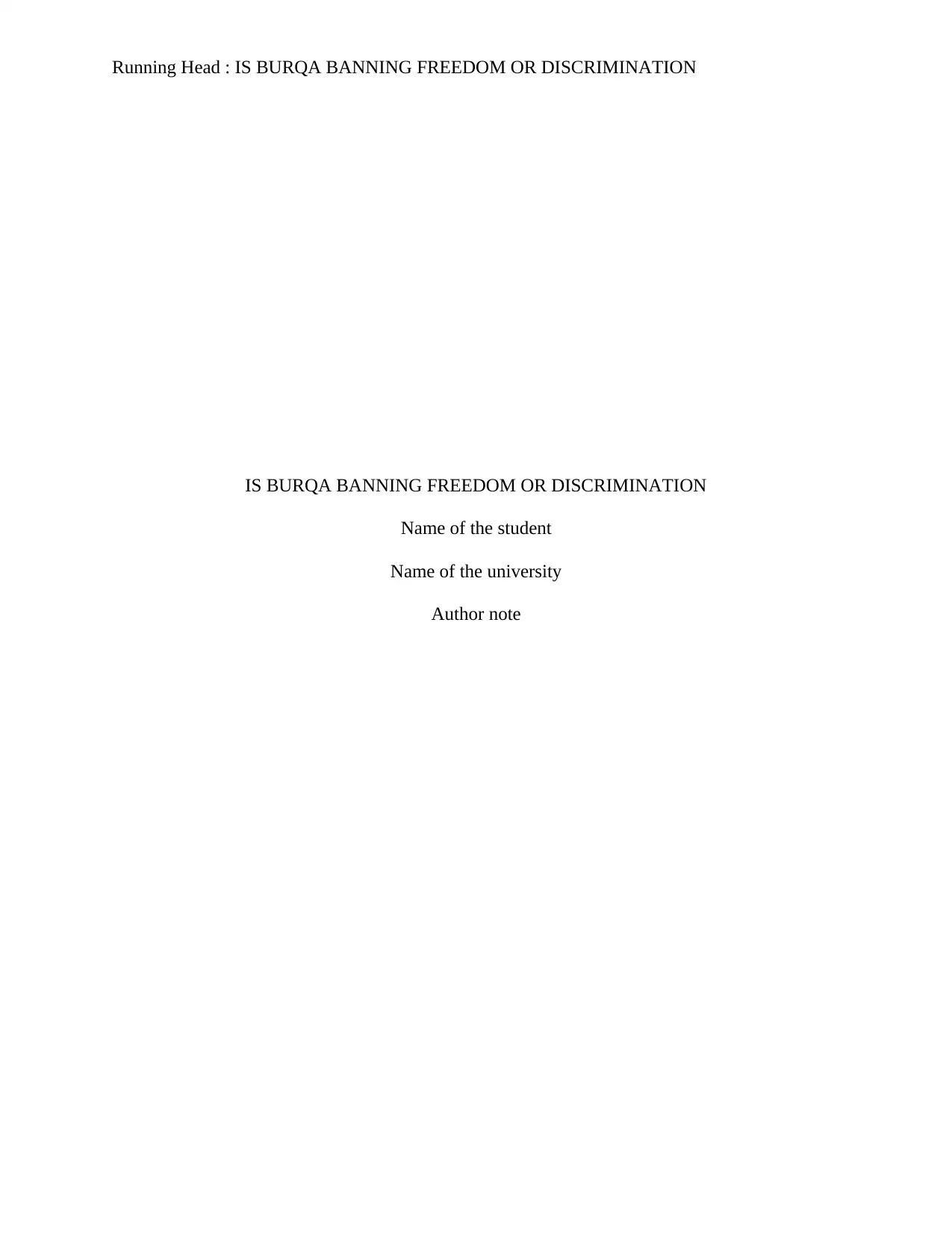
Running Head : IS BURQA BANNING FREEDOM OR DISCRIMINATION
IS BURQA BANNING FREEDOM OR DISCRIMINATION
Name of the student
Name of the university
Author note
IS BURQA BANNING FREEDOM OR DISCRIMINATION
Name of the student
Name of the university
Author note
Secure Best Marks with AI Grader
Need help grading? Try our AI Grader for instant feedback on your assignments.
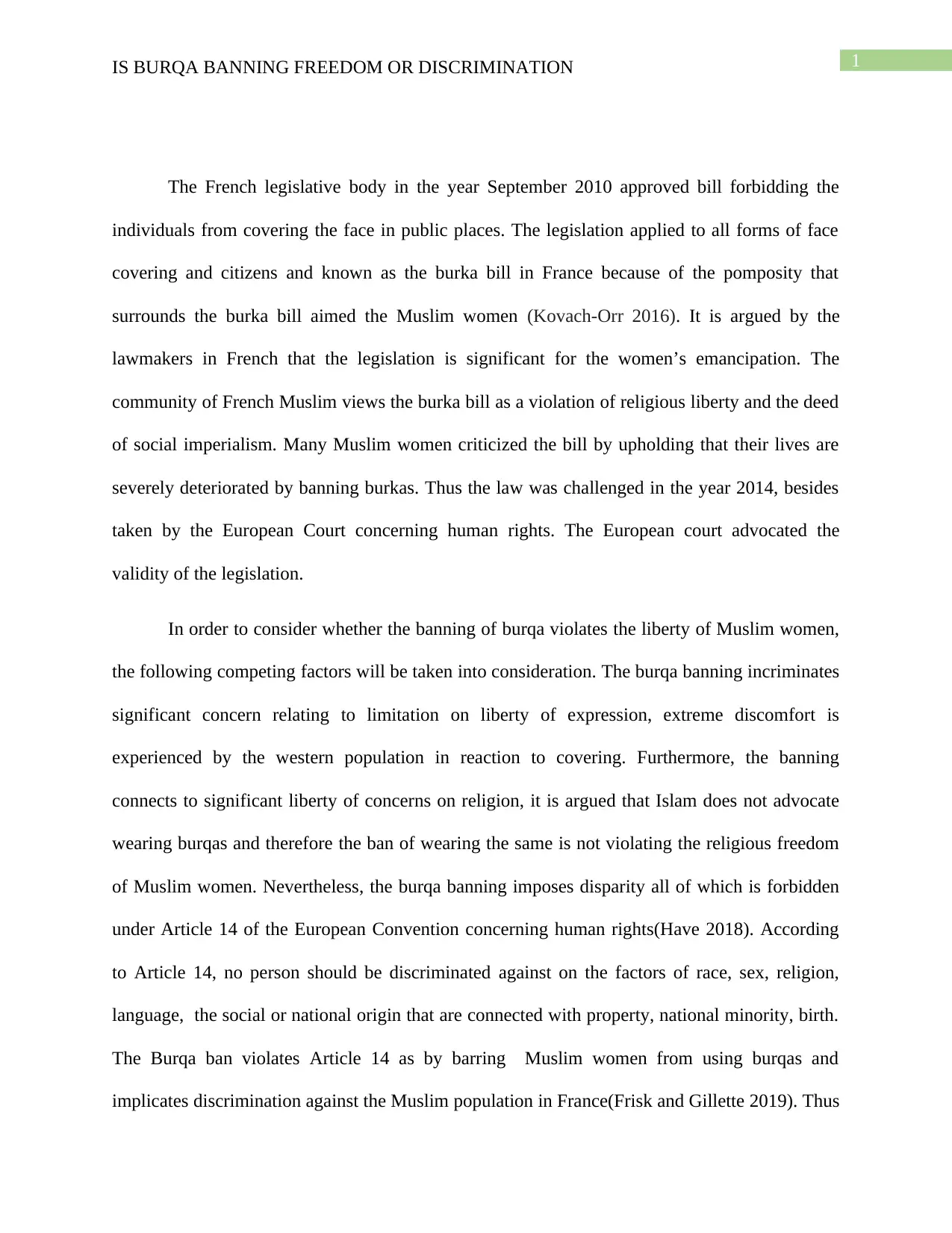
1IS BURQA BANNING FREEDOM OR DISCRIMINATION
The French legislative body in the year September 2010 approved bill forbidding the
individuals from covering the face in public places. The legislation applied to all forms of face
covering and citizens and known as the burka bill in France because of the pomposity that
surrounds the burka bill aimed the Muslim women (Kovach-Orr 2016). It is argued by the
lawmakers in French that the legislation is significant for the women’s emancipation. The
community of French Muslim views the burka bill as a violation of religious liberty and the deed
of social imperialism. Many Muslim women criticized the bill by upholding that their lives are
severely deteriorated by banning burkas. Thus the law was challenged in the year 2014, besides
taken by the European Court concerning human rights. The European court advocated the
validity of the legislation.
In order to consider whether the banning of burqa violates the liberty of Muslim women,
the following competing factors will be taken into consideration. The burqa banning incriminates
significant concern relating to limitation on liberty of expression, extreme discomfort is
experienced by the western population in reaction to covering. Furthermore, the banning
connects to significant liberty of concerns on religion, it is argued that Islam does not advocate
wearing burqas and therefore the ban of wearing the same is not violating the religious freedom
of Muslim women. Nevertheless, the burqa banning imposes disparity all of which is forbidden
under Article 14 of the European Convention concerning human rights(Have 2018). According
to Article 14, no person should be discriminated against on the factors of race, sex, religion,
language, the social or national origin that are connected with property, national minority, birth.
The Burqa ban violates Article 14 as by barring Muslim women from using burqas and
implicates discrimination against the Muslim population in France(Frisk and Gillette 2019). Thus
The French legislative body in the year September 2010 approved bill forbidding the
individuals from covering the face in public places. The legislation applied to all forms of face
covering and citizens and known as the burka bill in France because of the pomposity that
surrounds the burka bill aimed the Muslim women (Kovach-Orr 2016). It is argued by the
lawmakers in French that the legislation is significant for the women’s emancipation. The
community of French Muslim views the burka bill as a violation of religious liberty and the deed
of social imperialism. Many Muslim women criticized the bill by upholding that their lives are
severely deteriorated by banning burkas. Thus the law was challenged in the year 2014, besides
taken by the European Court concerning human rights. The European court advocated the
validity of the legislation.
In order to consider whether the banning of burqa violates the liberty of Muslim women,
the following competing factors will be taken into consideration. The burqa banning incriminates
significant concern relating to limitation on liberty of expression, extreme discomfort is
experienced by the western population in reaction to covering. Furthermore, the banning
connects to significant liberty of concerns on religion, it is argued that Islam does not advocate
wearing burqas and therefore the ban of wearing the same is not violating the religious freedom
of Muslim women. Nevertheless, the burqa banning imposes disparity all of which is forbidden
under Article 14 of the European Convention concerning human rights(Have 2018). According
to Article 14, no person should be discriminated against on the factors of race, sex, religion,
language, the social or national origin that are connected with property, national minority, birth.
The Burqa ban violates Article 14 as by barring Muslim women from using burqas and
implicates discrimination against the Muslim population in France(Frisk and Gillette 2019). Thus
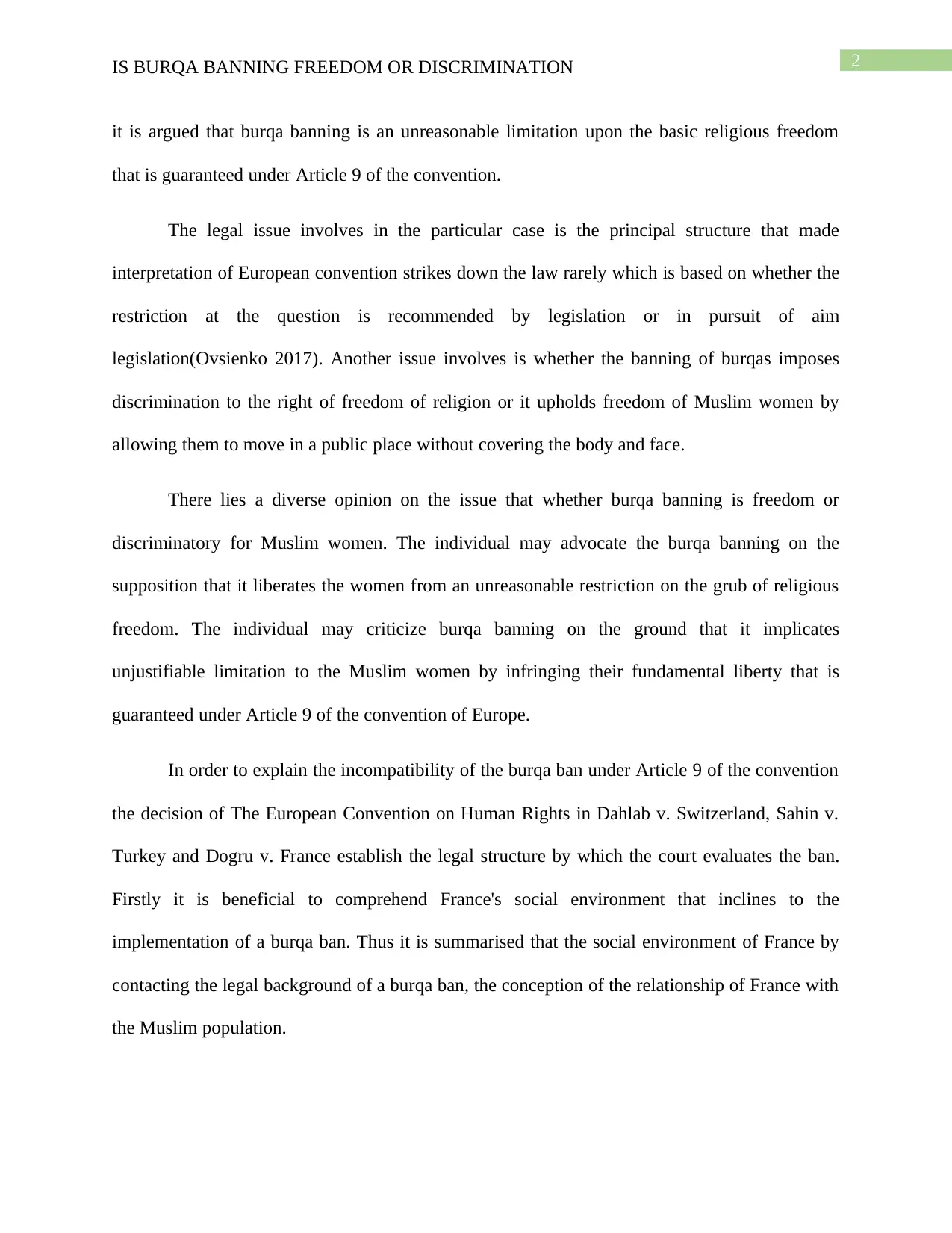
2IS BURQA BANNING FREEDOM OR DISCRIMINATION
it is argued that burqa banning is an unreasonable limitation upon the basic religious freedom
that is guaranteed under Article 9 of the convention.
The legal issue involves in the particular case is the principal structure that made
interpretation of European convention strikes down the law rarely which is based on whether the
restriction at the question is recommended by legislation or in pursuit of aim
legislation(Ovsienko 2017). Another issue involves is whether the banning of burqas imposes
discrimination to the right of freedom of religion or it upholds freedom of Muslim women by
allowing them to move in a public place without covering the body and face.
There lies a diverse opinion on the issue that whether burqa banning is freedom or
discriminatory for Muslim women. The individual may advocate the burqa banning on the
supposition that it liberates the women from an unreasonable restriction on the grub of religious
freedom. The individual may criticize burqa banning on the ground that it implicates
unjustifiable limitation to the Muslim women by infringing their fundamental liberty that is
guaranteed under Article 9 of the convention of Europe.
In order to explain the incompatibility of the burqa ban under Article 9 of the convention
the decision of The European Convention on Human Rights in Dahlab v. Switzerland, Sahin v.
Turkey and Dogru v. France establish the legal structure by which the court evaluates the ban.
Firstly it is beneficial to comprehend France's social environment that inclines to the
implementation of a burqa ban. Thus it is summarised that the social environment of France by
contacting the legal background of a burqa ban, the conception of the relationship of France with
the Muslim population.
it is argued that burqa banning is an unreasonable limitation upon the basic religious freedom
that is guaranteed under Article 9 of the convention.
The legal issue involves in the particular case is the principal structure that made
interpretation of European convention strikes down the law rarely which is based on whether the
restriction at the question is recommended by legislation or in pursuit of aim
legislation(Ovsienko 2017). Another issue involves is whether the banning of burqas imposes
discrimination to the right of freedom of religion or it upholds freedom of Muslim women by
allowing them to move in a public place without covering the body and face.
There lies a diverse opinion on the issue that whether burqa banning is freedom or
discriminatory for Muslim women. The individual may advocate the burqa banning on the
supposition that it liberates the women from an unreasonable restriction on the grub of religious
freedom. The individual may criticize burqa banning on the ground that it implicates
unjustifiable limitation to the Muslim women by infringing their fundamental liberty that is
guaranteed under Article 9 of the convention of Europe.
In order to explain the incompatibility of the burqa ban under Article 9 of the convention
the decision of The European Convention on Human Rights in Dahlab v. Switzerland, Sahin v.
Turkey and Dogru v. France establish the legal structure by which the court evaluates the ban.
Firstly it is beneficial to comprehend France's social environment that inclines to the
implementation of a burqa ban. Thus it is summarised that the social environment of France by
contacting the legal background of a burqa ban, the conception of the relationship of France with
the Muslim population.
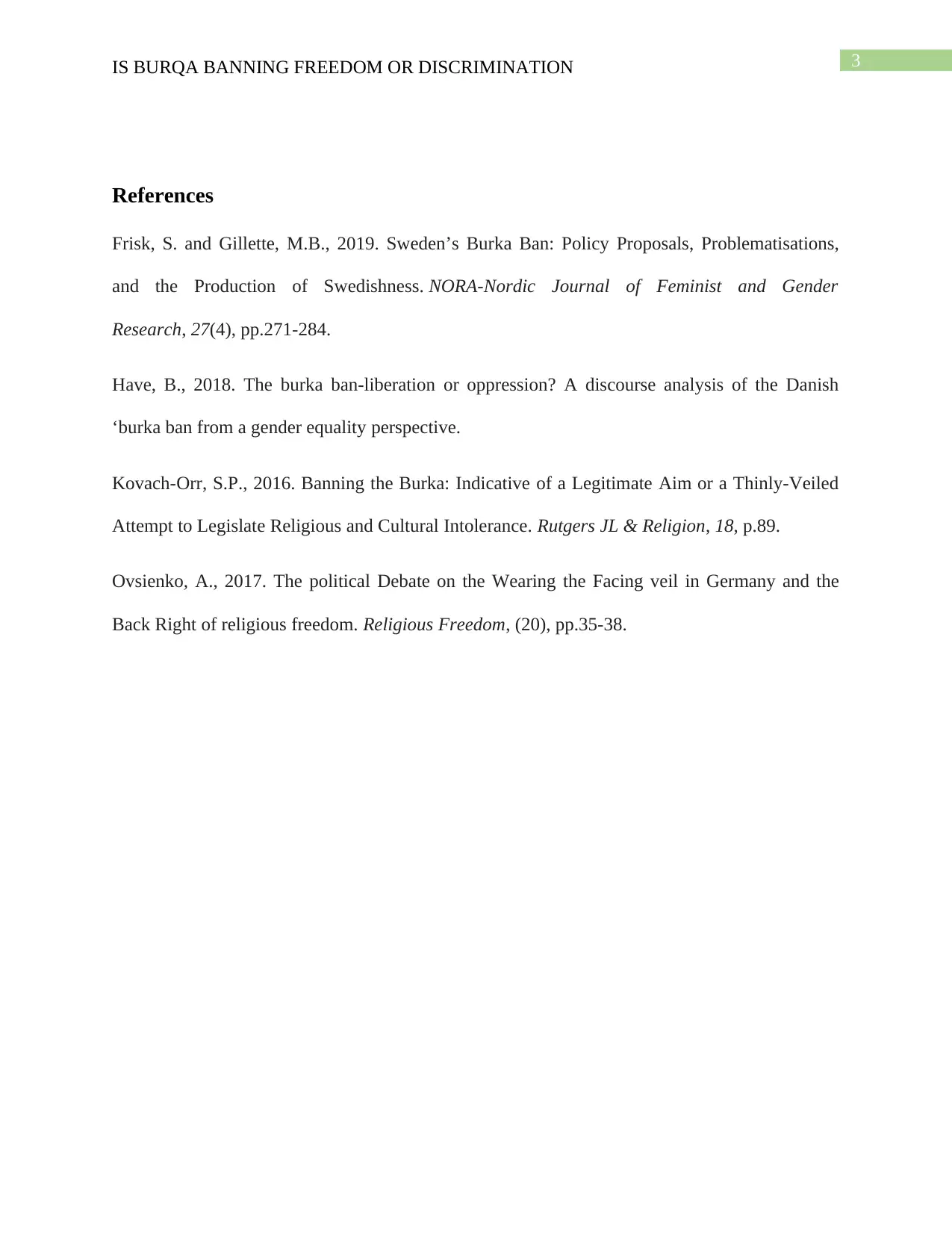
3IS BURQA BANNING FREEDOM OR DISCRIMINATION
References
Frisk, S. and Gillette, M.B., 2019. Sweden’s Burka Ban: Policy Proposals, Problematisations,
and the Production of Swedishness. NORA-Nordic Journal of Feminist and Gender
Research, 27(4), pp.271-284.
Have, B., 2018. The burka ban-liberation or oppression? A discourse analysis of the Danish
‘burka ban from a gender equality perspective.
Kovach-Orr, S.P., 2016. Banning the Burka: Indicative of a Legitimate Aim or a Thinly-Veiled
Attempt to Legislate Religious and Cultural Intolerance. Rutgers JL & Religion, 18, p.89.
Ovsienko, A., 2017. The political Debate on the Wearing the Facing veil in Germany and the
Back Right of religious freedom. Religious Freedom, (20), pp.35-38.
References
Frisk, S. and Gillette, M.B., 2019. Sweden’s Burka Ban: Policy Proposals, Problematisations,
and the Production of Swedishness. NORA-Nordic Journal of Feminist and Gender
Research, 27(4), pp.271-284.
Have, B., 2018. The burka ban-liberation or oppression? A discourse analysis of the Danish
‘burka ban from a gender equality perspective.
Kovach-Orr, S.P., 2016. Banning the Burka: Indicative of a Legitimate Aim or a Thinly-Veiled
Attempt to Legislate Religious and Cultural Intolerance. Rutgers JL & Religion, 18, p.89.
Ovsienko, A., 2017. The political Debate on the Wearing the Facing veil in Germany and the
Back Right of religious freedom. Religious Freedom, (20), pp.35-38.
Secure Best Marks with AI Grader
Need help grading? Try our AI Grader for instant feedback on your assignments.
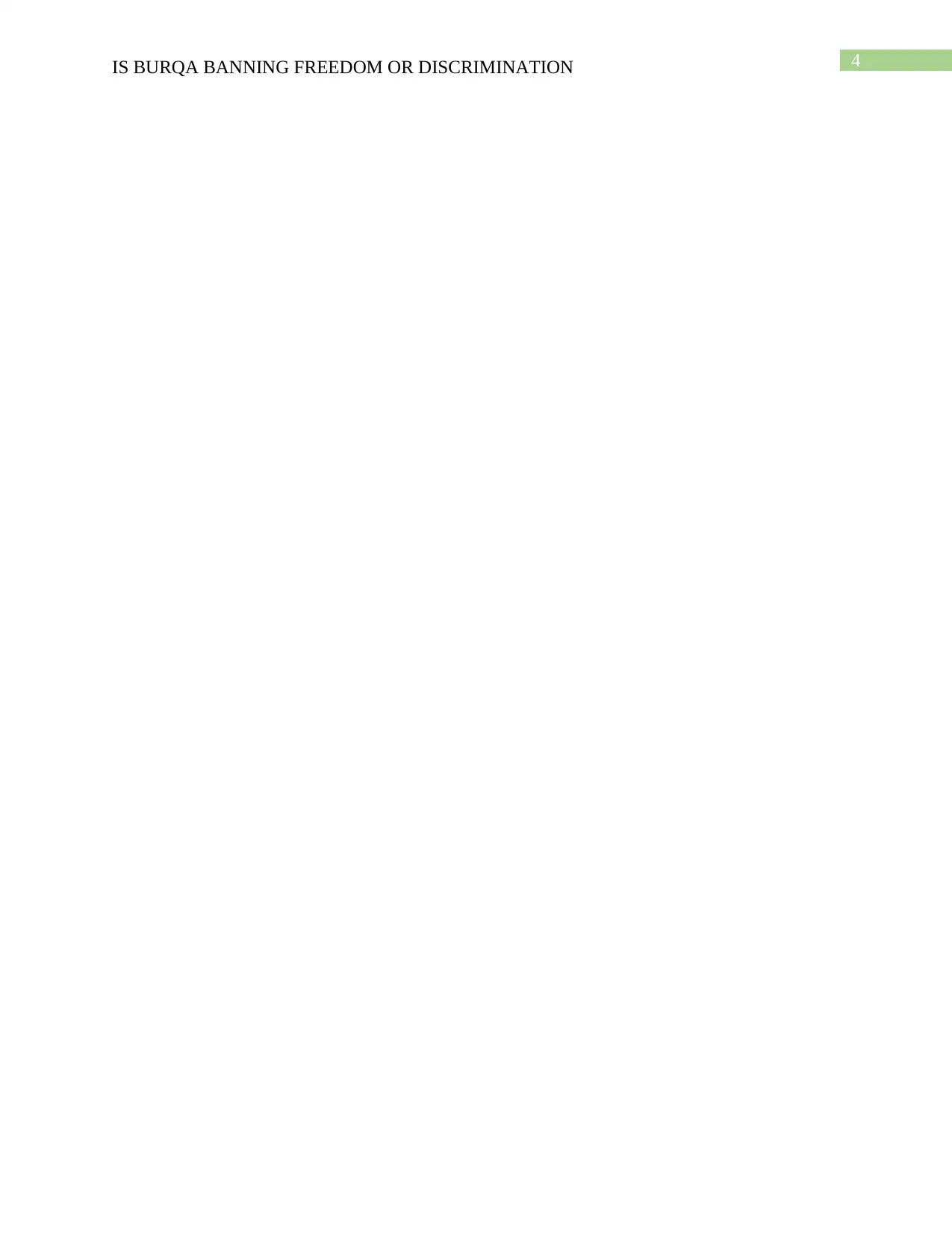
4IS BURQA BANNING FREEDOM OR DISCRIMINATION
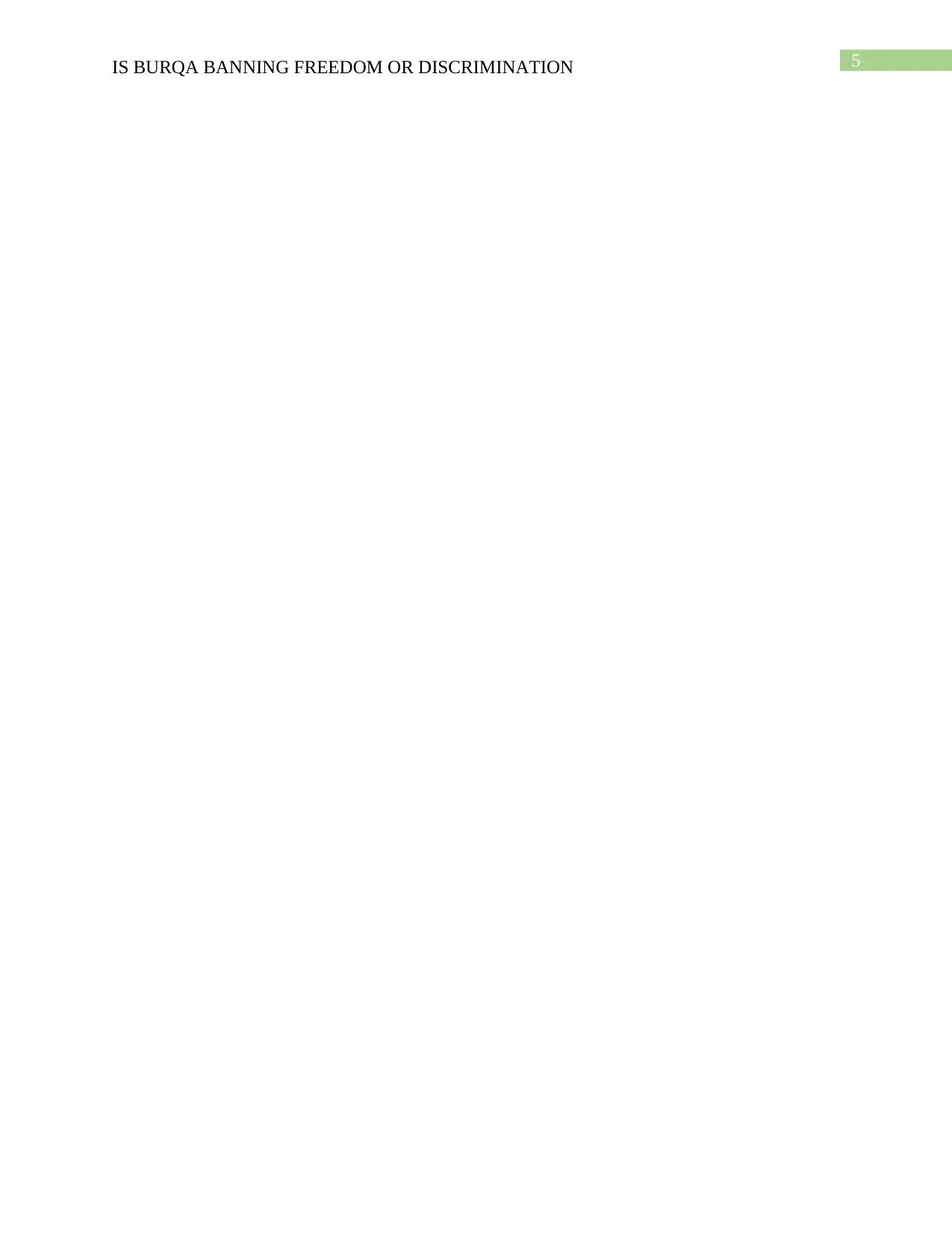
5IS BURQA BANNING FREEDOM OR DISCRIMINATION
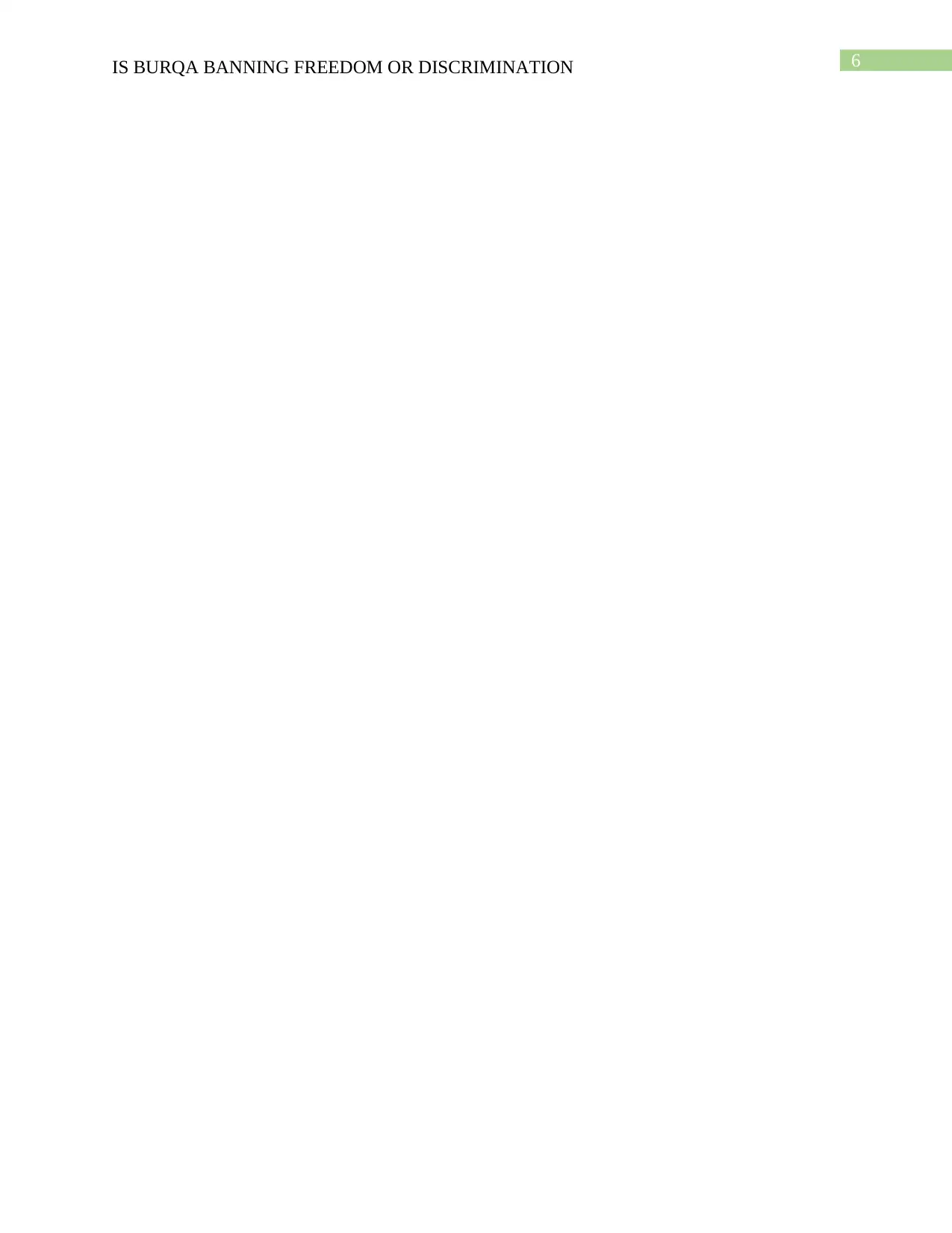
6IS BURQA BANNING FREEDOM OR DISCRIMINATION
Paraphrase This Document
Need a fresh take? Get an instant paraphrase of this document with our AI Paraphraser
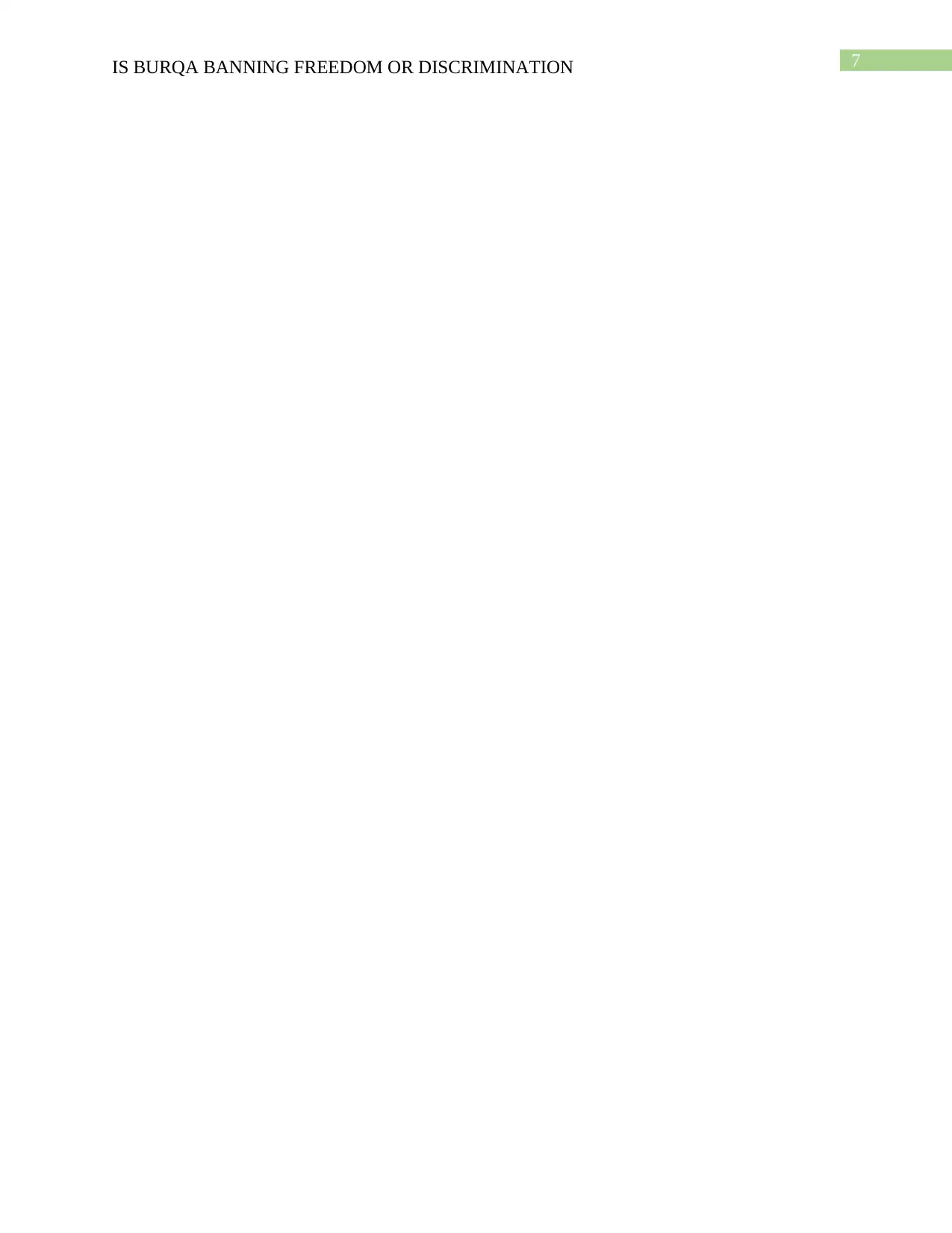
7IS BURQA BANNING FREEDOM OR DISCRIMINATION
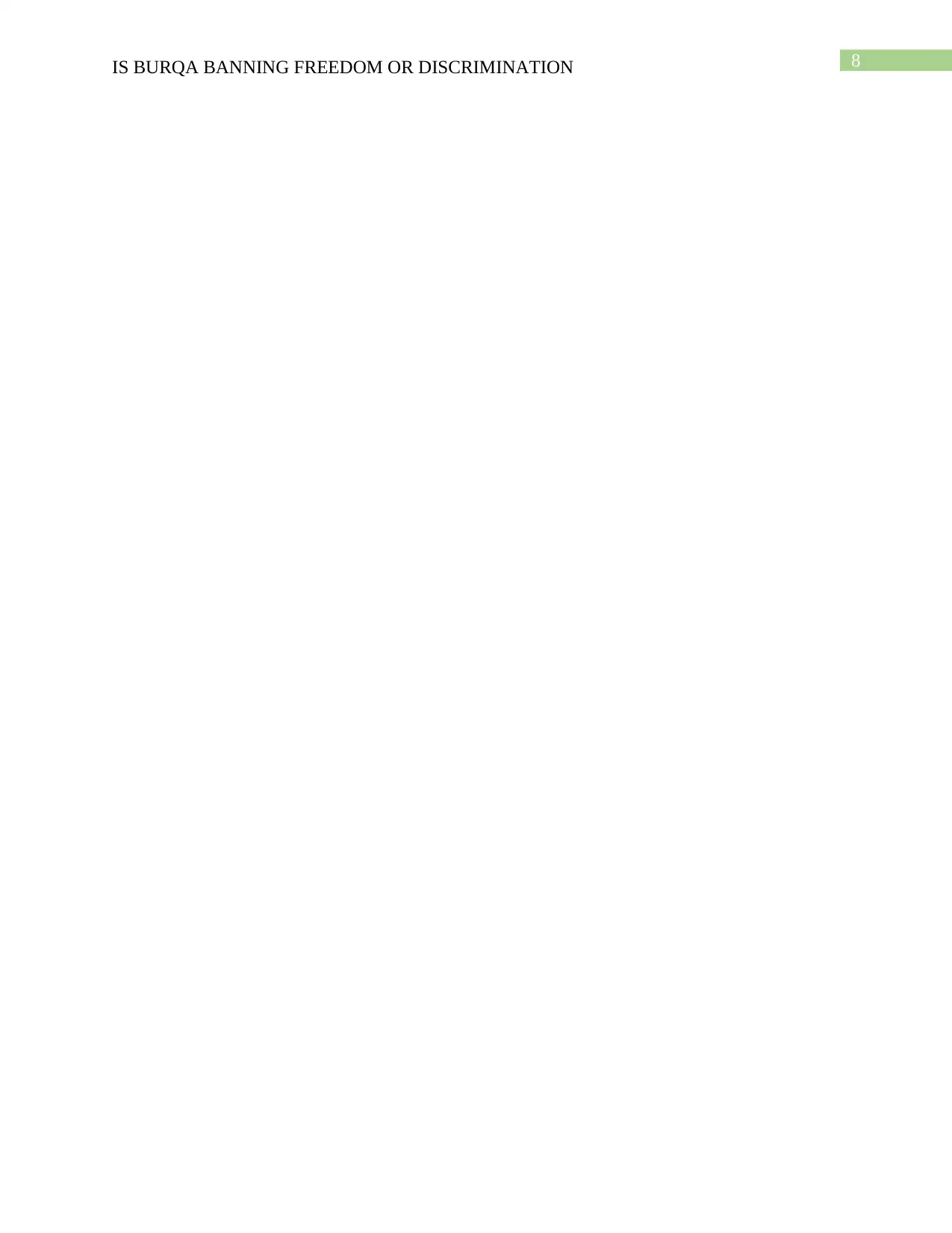
8IS BURQA BANNING FREEDOM OR DISCRIMINATION
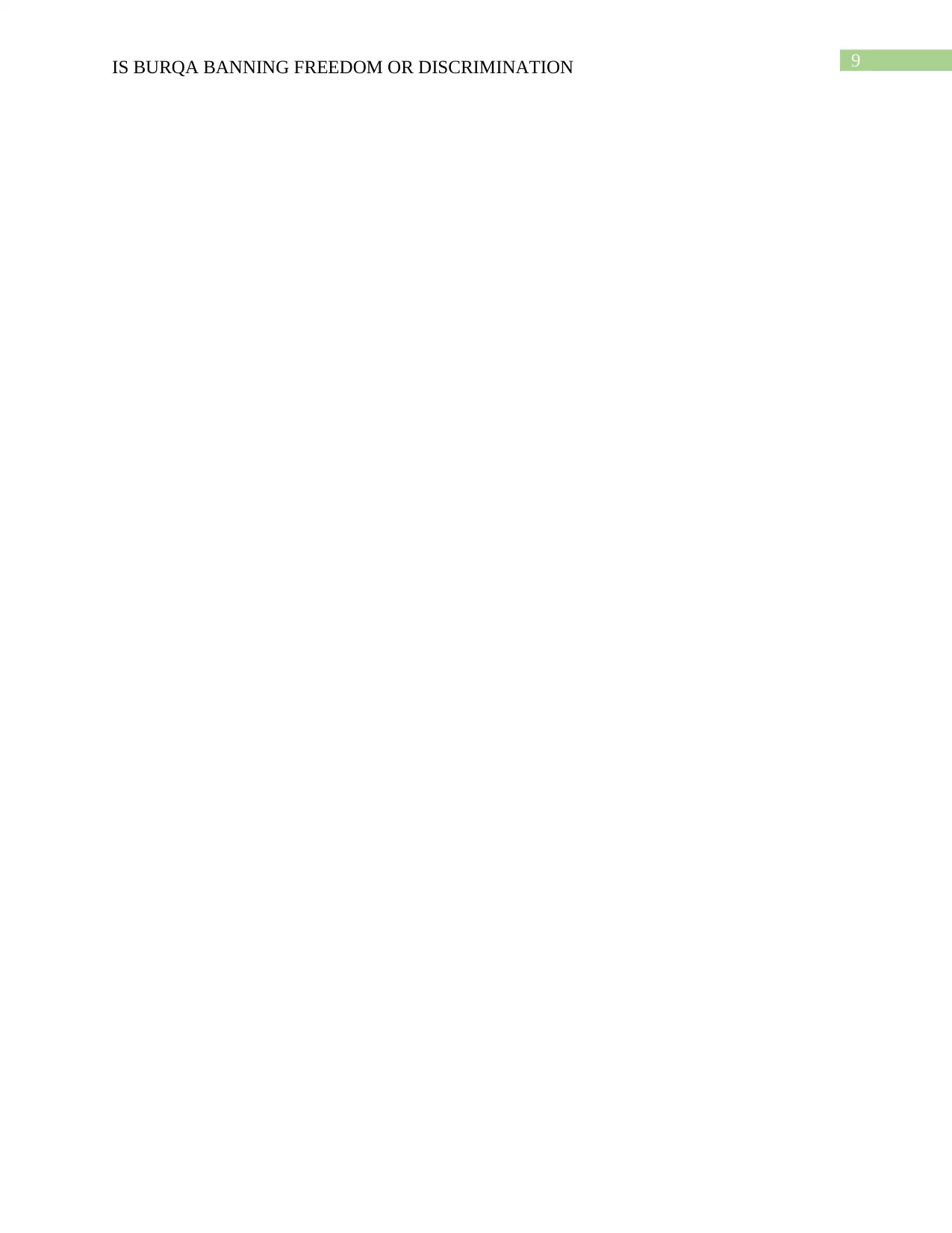
9IS BURQA BANNING FREEDOM OR DISCRIMINATION
Secure Best Marks with AI Grader
Need help grading? Try our AI Grader for instant feedback on your assignments.
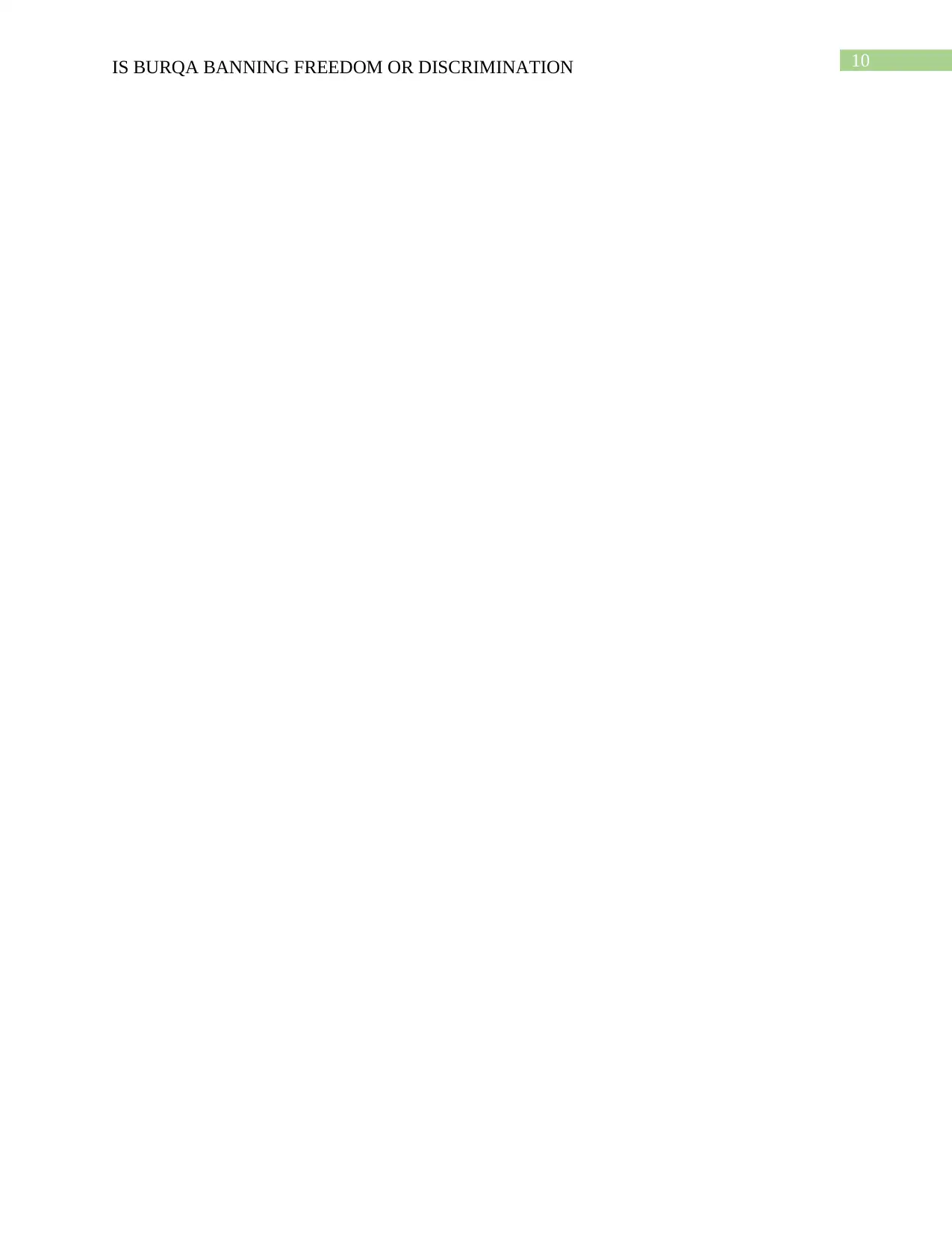
10IS BURQA BANNING FREEDOM OR DISCRIMINATION
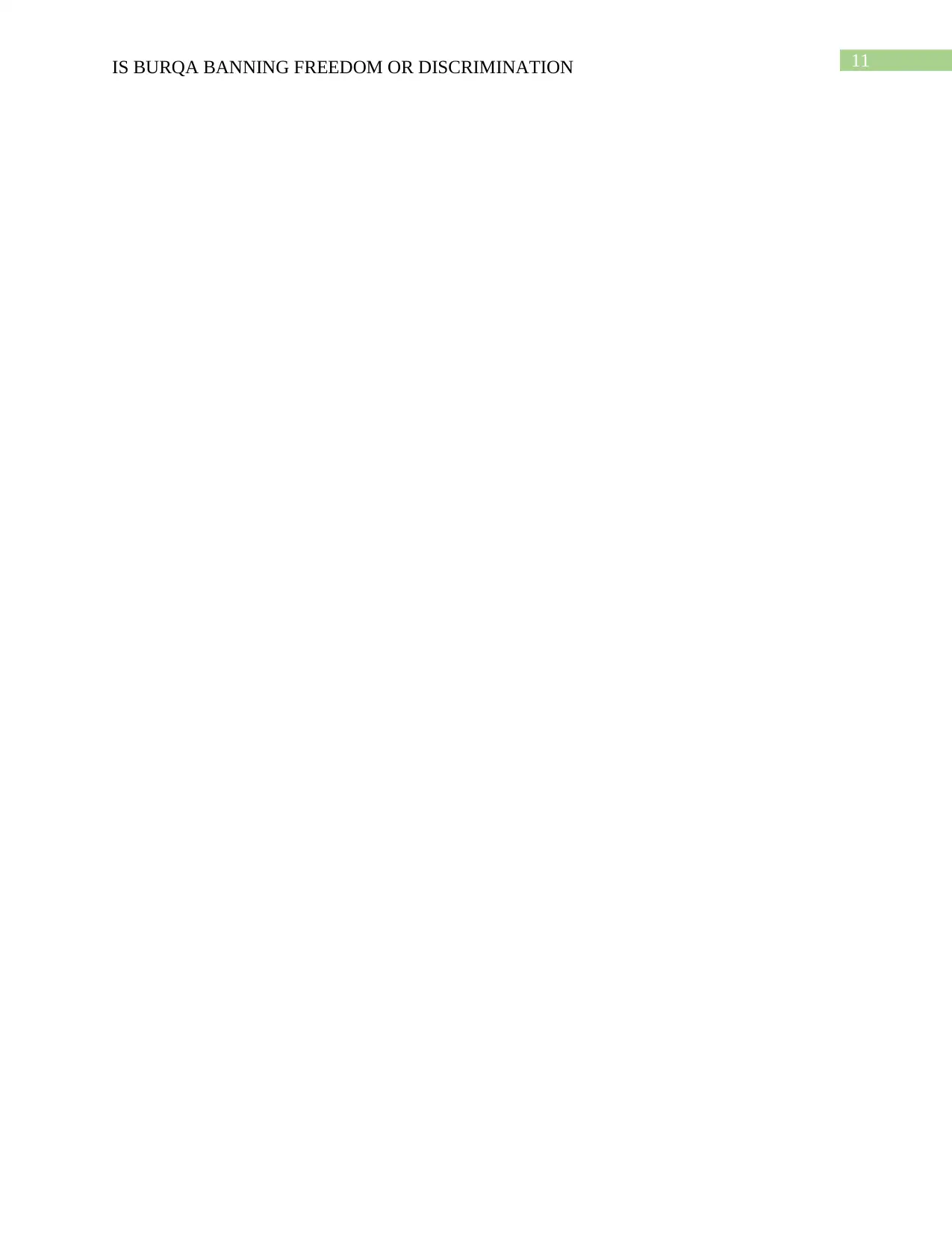
11IS BURQA BANNING FREEDOM OR DISCRIMINATION
1 out of 12
Your All-in-One AI-Powered Toolkit for Academic Success.
+13062052269
info@desklib.com
Available 24*7 on WhatsApp / Email
![[object Object]](/_next/static/media/star-bottom.7253800d.svg)
Unlock your academic potential
© 2024 | Zucol Services PVT LTD | All rights reserved.

